Compañia Irene Rodríguez, one of Cuba’s leading flamenco dance companies, returns to the Cuba Festival at the Joyce Theater Friday-Sunday, January 18-20, 2019. From $10
Compañia Irene Rodríguez Program
Praised as “intense” and “exacting” by The New York Times, with a vivacious ensemble that “has succeeded in positioning itself among the best of the Spanish genre in Cuba” (Granma, Cuba), Irene Rodríguez follows up her wildly successful 2016 Joyce debut with an exhilarating program of short works, Mas Que Flamenco (More Than Flamenco).
Compañia Irene Rodríguez Performances
January 18, Friday at 8pm
January 19, Saturday at 2pm. Curtain chat follows the show.
January 19, Saturday at 8pm
January 20, Sunday at 2 pm
January 20, Sunday at 7:30pm
Compañia Irene Rodríguez Tickets

From $10
Joyce Theater tickets are available at the box office, by phone and online. $10 tickets are only available by phone.
Tickets at the Box Office
Daily: 12pm – 6pm
On days when there are performances, the box office is open through curtain time, but advance sales end one hour before curtain time.
Tickets by Phone
JoyceCharge: (212) 242-0800
Tickets Online
A $6 per ticket web fee is applied.
Joyce Theater Directions
Irene Rodríguez
As a girl Irene Rodríguez began studying flamenco at Centro Andaluz, an old Spanish social club like New York City’s La Nacional, which is now almost entirely devoted to flamenco.
Her natural talent and dramatic flair quickly led the young dancer to Ballet Español de Cuba, the flamenco company of Cuban ballet legend Alicia Alonso. Rodríquez trained there and became a prima ballerina in 2007.
Compañia Irene Rodríguez
The artist set off on her own and founded Compañía Irene Rodríguez in 2012. It performs around the world.
The company debuted at the prestigious Jacob’s Pillow dance festival in 2017 and was invited back in 2018. It performed at the Kennedy Center’s Artes de Cuba festival in 2018.
The Spanish government and King of Spain recently recognized Rodríguez with the Order of Isabella the Catholic, a civil award for service to Spain.
Rodríquez is now developing the next generation of flamenco talent around the world. She is one of those forces of nature that lives in the flamenco.
www.irenerodriguezcompania.com
Cuban Flamenco
In our lifetimes, we have called the big island of the Caribbean, “Cuba.” But from shortly after 1492 until 1899 it was “New Spain,” the gem of the Spanish Empire and gateway to the New World.
Great wealth passed through Cuba because Spanish galleons filled with treasure plundered from the Americas would assemble at Havana into convoys for the Atlantic crossing.
Something else important passed through Cuba: African slaves. Havana, Cuba (Spanish); Rio de Janeiro, Brazil (Portuguese); and Charleston, South Carolina (English) were the main slaving ports of the Americas. There is something about African movement that is special and unique in the world.
New Spain (Cuba) was where the Spanish guitar and the African drum mixed together. That Spanish guitar was playing flamenco. That blend evolved into what we now call Latin music and Latin dance (salsa, merengue, bachata and even tango).
What happened in Cuba traveled with the slaves across the Spanish Americas. Even most of New York City’s slaves came from Cuba.
Cuban flamenco also went back to Spain. Rumba Flamenco is an ida y vuelta (round-trip) style of Spanish flamenco influenced by the dance in Cuba.
It’s exciting to see watch Compañia Irene Rodríguez because it is not just a copy of Spanish flamenco. It is Cuban flamenco in all its glory.
Joyce Theater Cuba Festival 2018
Malpaso Dance Company + Los Hijos del Director + Compañia Irene Rodríguez
¡Olé!
